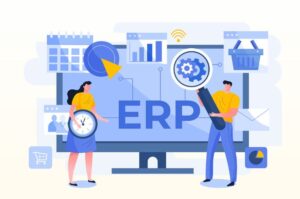
In the fast-paced world of modern business, staying competitive requires more than just delivering a quality product or service. It demands efficiency, agility, and a keen understanding of organizational processes. This is where Enterprise Resource Planning (ERP) systems come into play, serving as the backbone of operations for countless businesses worldwide. In this blog, we’ll delve into the myriad benefits of ERP and explore how it empowers organizations to thrive in today’s dynamic marketplace.
Streamlined Operations
At its core, ERP is designed to integrate and streamline key business processes, from finance and human resources to supply chain management and customer relationship management. By consolidating data and workflows into a single, centralized platform, ERP eliminates silos and inefficiencies, enabling seamless communication and collaboration across departments. This not only enhances operational visibility but also improves decision-making and resource allocation, ultimately driving productivity and profitability.
Enhanced Visibility and Reporting
One of the most significant advantages of ERP is its ability to provide real-time insights into business performance. With advanced reporting and analytics capabilities, ERP enables stakeholders to access up-to-date information on key metrics, such as sales trends, inventory levels, and financial projections. This enhanced visibility empowers decision-makers to identify opportunities, mitigate risks, and optimize processes more effectively, leading to better-informed strategic decisions and improved overall performance.
Improved Efficiency and Cost Savings
By automating repetitive tasks and streamlining workflows, ERP helps organizations operate more efficiently, reducing manual errors and minimizing wastage of time and resources. Whether it’s automating financial transactions, optimizing inventory management, or streamlining procurement processes, ERP enables businesses to accomplish more with less, driving significant cost savings in the process. Moreover, by standardizing and enforcing best practices across the organization, ERP helps minimize operational risks and ensure compliance with regulatory requirements, further contributing to cost containment and risk mitigation.
Enhanced Customer Experience
In today’s hyper-competitive market, delivering exceptional customer experiences is essential for sustainable growth. ERP plays a crucial role in this regard by enabling organizations to better understand and serve their customers. By centralizing customer data and interactions, ERP facilitates personalized marketing campaigns, targeted sales efforts, and responsive customer service, fostering stronger relationships and driving customer loyalty. Moreover, by optimizing order fulfillment and delivery processes, ERP helps ensure timely and accurate service, further enhancing the overall customer experience.
Scalability and Adaptability
As businesses grow and evolve, their needs and requirements inevitably change. One of the key advantages of ERP is its scalability and adaptability, allowing organizations to easily accommodate growth and adapt to changing market conditions. Whether it’s expanding into new markets, adding new product lines, or integrating with third-party systems, ERP provides the flexibility and agility needed to support business growth and innovation. Moreover, with cloud-based ERP solutions becoming increasingly prevalent, businesses can scale their operations more seamlessly and cost-effectively than ever before.
Conclusion
In today’s digital age, the benefits of ERP are undeniable. From streamlining operations and enhancing visibility to driving efficiency and facilitating growth, ERP empowers organizations to thrive in an increasingly complex and competitive business environment. By embracing ERP as a strategic investment and leveraging its capabilities to their fullest extent, businesses can unlock new opportunities, drive sustainable growth, and position themselves for success in the digital era.
